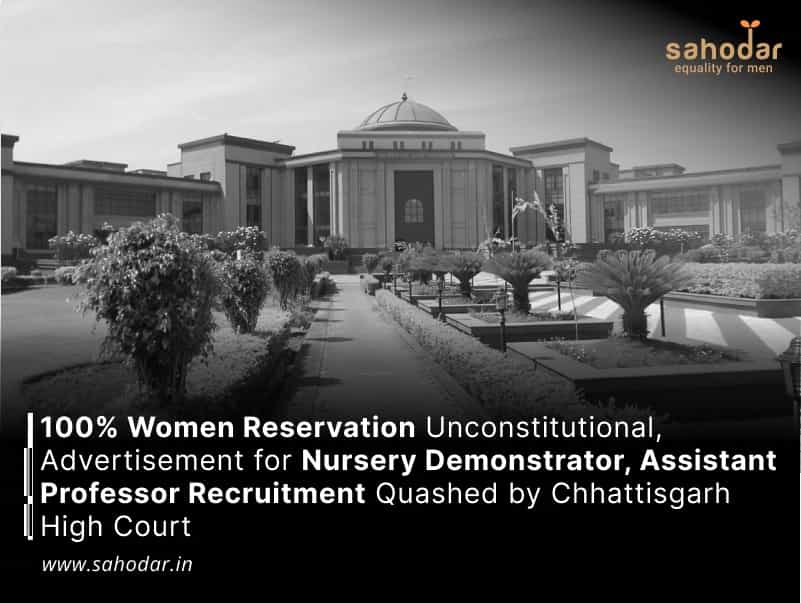The Chhattisgarh High Court has invalidated Note-2 under Schedule-III of the Chhattisgarh Medical Education (Gazetted) Service Recruitment Rules, 2013 and the corresponding advertisement for the recruitment of Assistant Professor (Nursing) and Demonstrator, as it reserved 100% of the seats for women. The court found the scheme unconstitutional and violating Articles 14, 15, and 16 of the Indian Constitution, as well as being arbitrary and not protected by Article 15(3). Consequently, the court quashed the recruitment rules on the grounds of equality before the law and equality of opportunity in public employment.
On December 8, 2021, the Chhattisgarh Public Service Commission released an advertisement to fill various positions of Assistant Professor (Nursing) and Demonstrator for different subjects. However, only female candidates were eligible to apply and be appointed for the post of Assistant Professor (Nursing) and Demonstrator, according to Clause-5 of the advertisement. The petitioners, who had the necessary educational qualifications for the Demonstrator position, were unable to apply because of Note-2 mentioned in the Rules and Clause-5 of the advertisement. Consequently, they filed writ petitions to challenge these rules.
The petitioners’ argument was that the Rules dictated that 50% of Demonstrator positions and 75% of Assistant Professor positions for Nursing colleges should be filled by direct recruitment, and the remaining vacancies should be filled by promotion. Therefore, they contended that the reservation of 100% of direct recruitment seats for female candidates was unconstitutional.
They further claimed that even in the promotion-based recruitment, the Chhattisgarh Civil Services (Special Provision for Appointment of Women) Rule, 1997 stipulated a horizontal reservation of 30% for women, which would result in more than 100% reservation for women.
The petitioners also claimed that the restriction on male candidates was arbitrary and unfounded since both male and female teachers could teach nursing courses, and there was no justification for reserving all teaching positions for women.
Finally, they argued that Note-2 of the Rules and the advertisement violated their right to employment, and were thus unconstitutional under Articles 14, 15, and 16 of the Constitution.
On behalf of the State, it was argued that male nurses were mainly utilized for specific purposes such as Orthopaedics wards, Psychiatry wards, and Medico Legal cases in government hospitals, while female nurses were used for the majority of nursing work. Thus, it was argued that the nursing field was dominated by women and this was reflected in the Chhattisgarh Nursing Entrance Rules, 2019, which reserved all seats in Government Nursing Colleges for women candidates.
It was also pointed out that the Constitution itself provided for special provisions for women and children under Article 15(3) and that Articles 15(1) and 16(1) prohibited certain employment practices by the State. Therefore, it was argued that classification between male and female for certain positions was permissible, and such classification could not be considered arbitrary or unjustified. As it was a policy decision of the State, and the Rules were framed for this purpose, they could not be deemed arbitrary or unjustified.
The Court observed that Article 16(2) of the Constitution deals with equality of opportunity in public employment and prohibits discrimination on the basis of various factors including sex. The provision also covers the specialized area of public employment. The Court highlighted that the word “sex” used in Article 16(2) of the Constitution is significant as it prohibits discrimination on the basis of sex. Article 16(4) of the Constitution provides for reservation for backward classes, and it must be read along with Article 16(2) to ensure that no discrimination on the basis of sex is permitted.
The Court referred to the Indra Sawhney case and concluded that reservation for women in public employment is not permitted under Article 15(3) of the Constitution, and Article 16(2) of the Constitution prohibits reservation on the basis of sex. The Court further noted that the reservation issue remains open for the Parliament to provide for the vulnerable class of candidates, as it is not covered under Article 16(4) of the Constitution. The Apex Court had held in the Indra Sawhney case that women cannot be included under the category of backward class of citizens, and are separately categorized as a vulnerable class for which there is no provision in the Constitution for reservation.
The Court held that allowing reservation for women in public employment under Article 15(3) of the Constitution would contradict the main provision of public employment under Article 16(2), which prohibits discrimination on the ground of ‘sex’. The Court also rejected the argument made on behalf of the State that the Rules cannot be questioned since they were framed under Article 309(2) by the competent authority.
The Court found that the Rules were arbitrary and violated Articles 14, 15, and 16 of the Constitution. Therefore, the Court held that 100% reservation for female candidates for the posts of Demonstrator and Assistant Professor is unconstitutional and violative of Articles 14 and 16 of the Constitution. The Court also quashed Note-2 in Schedule-III of the Rules and Clause-5 of the advertisement.
Source: https://www.livelaw.in/news-updates/chhattisgarh-high-court-discrimination-on-the-ground-of-sex-100-percent-reservation-for-women-public-employment-223479

